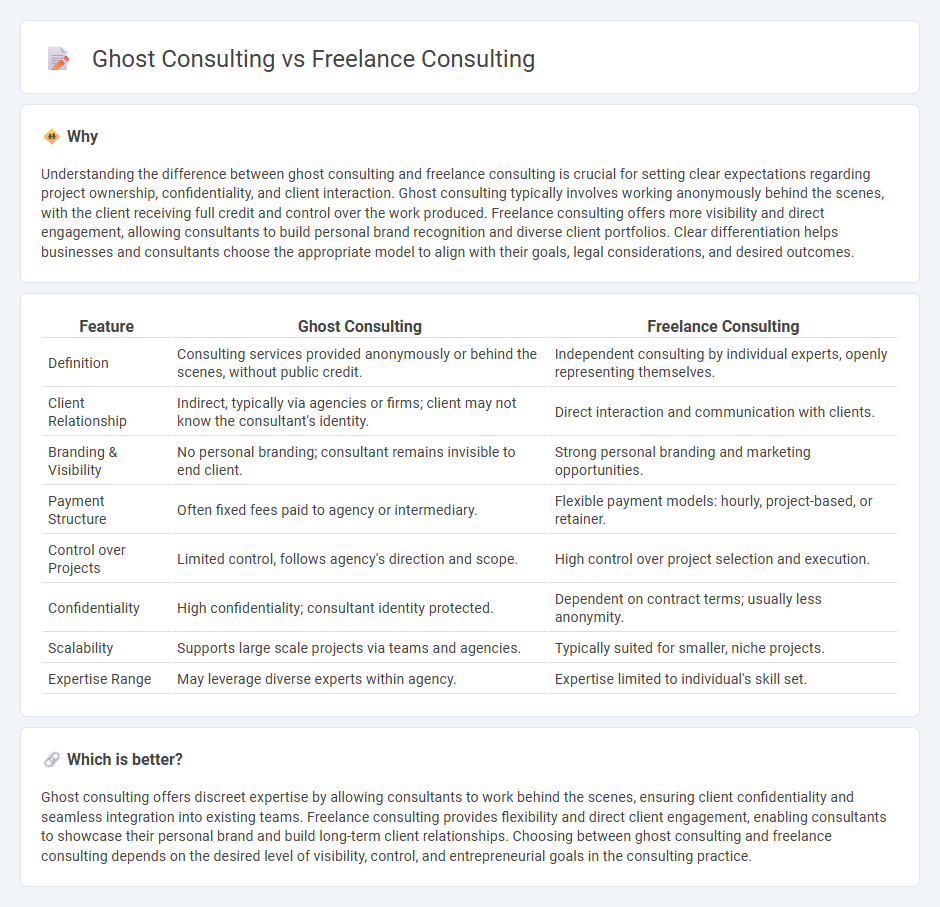
Ghost consulting involves working behind the scenes to provide expert advice without public recognition, often benefiting larger firms or executives seeking confidential insights. In contrast, freelance consulting offers visible, independent advisory services directly to clients, emphasizing flexibility and personal branding. Explore the nuances of ghost consulting versus freelance consulting to determine which approach suits your professional goals.
Why it is important
Understanding the difference between ghost consulting and freelance consulting is crucial for setting clear expectations regarding project ownership, confidentiality, and client interaction. Ghost consulting typically involves working anonymously behind the scenes, with the client receiving full credit and control over the work produced. Freelance consulting offers more visibility and direct engagement, allowing consultants to build personal brand recognition and diverse client portfolios. Clear differentiation helps businesses and consultants choose the appropriate model to align with their goals, legal considerations, and desired outcomes.
Comparison Table
| Feature | Ghost Consulting | Freelance Consulting |
|---|---|---|
| Definition | Consulting services provided anonymously or behind the scenes, without public credit. | Independent consulting by individual experts, openly representing themselves. |
| Client Relationship | Indirect, typically via agencies or firms; client may not know the consultant's identity. | Direct interaction and communication with clients. |
| Branding & Visibility | No personal branding; consultant remains invisible to end client. | Strong personal branding and marketing opportunities. |
| Payment Structure | Often fixed fees paid to agency or intermediary. | Flexible payment models: hourly, project-based, or retainer. |
| Control over Projects | Limited control, follows agency's direction and scope. | High control over project selection and execution. |
| Confidentiality | High confidentiality; consultant identity protected. | Dependent on contract terms; usually less anonymity. |
| Scalability | Supports large scale projects via teams and agencies. | Typically suited for smaller, niche projects. |
| Expertise Range | May leverage diverse experts within agency. | Expertise limited to individual's skill set. |
Which is better?
Ghost consulting offers discreet expertise by allowing consultants to work behind the scenes, ensuring client confidentiality and seamless integration into existing teams. Freelance consulting provides flexibility and direct client engagement, enabling consultants to showcase their personal brand and build long-term client relationships. Choosing between ghost consulting and freelance consulting depends on the desired level of visibility, control, and entrepreneurial goals in the consulting practice.
Connection
Ghost consulting and freelance consulting both revolve around providing expert advice and solutions independently, often without being officially credited or publicly acknowledged. Freelance consultants operate on a project basis, offering specialized knowledge to diverse clients, while ghost consultants deliver behind-the-scenes support, enabling businesses to implement strategies without revealing their involvement. These roles share flexibility, autonomy, and a focus on tailored consultancy services outside traditional firm structures.
Key Terms
Client Visibility
Freelance consulting enhances client visibility by directly showcasing the consultant's expertise and building a strong personal brand through transparent client interactions. Ghost consulting limits visibility as the consultant works behind the scenes, allowing the client to take public credit for the outcomes. Explore the key differences and benefits of each consulting style to determine the best fit for your business needs.
Attribution
Freelance consulting offers direct client engagement with clear attribution, allowing consultants to showcase their expertise and build a personal brand. Ghost consulting involves behind-the-scenes work where contributions remain anonymous, potentially limiting recognition but providing flexibility and confidentiality for clients. Explore the key differences and benefits of each consulting style to determine the best fit for your professional goals.
Branding
Freelance consulting in branding involves direct collaboration with clients to develop personalized strategies and enhance brand identity, while ghost consulting provides behind-the-scenes expertise without public acknowledgment. Freelancers often build visible portfolios, establishing credibility through client success stories, whereas ghost consultants influence brand development discreetly, typically for larger agencies or corporations. Explore more insights to understand the strategic differences and benefits of each consulting approach in branding.
Source and External Links
How To Become a Freelance Consultant | Indeed.com - Freelance consultants are independent experts offering advice across various industries, working with multiple clients to improve business operations, marketing strategies, or management processes while enjoying flexible schedules and client choices.
How to Become a Freelance Consultant--a Straightforward Guide - Freelance consultants solve problems and provide fresh insights to businesses, specializing in areas like business process improvement or financial advisory, often working on specific projects with measurable outcomes.
Freelance Consulting 101 - Insurance Canopy - Freelance consulting involves self-employed professionals who set their own rates, choose clients and projects, potentially earn higher income, and gain varied experiences by working with different businesses under contractual terms.
 dowidth.com
dowidth.com